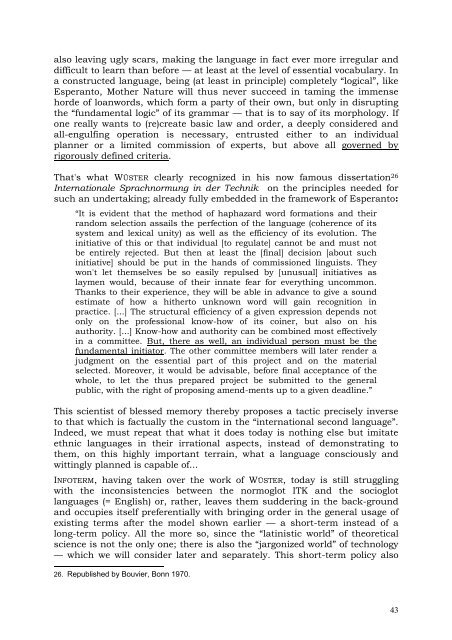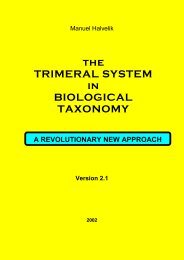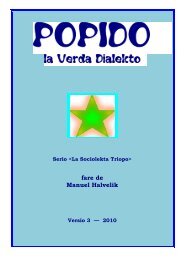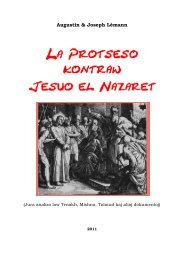- Page 1 and 2: The INTERNATIONAL TERMINOLOGICAL KE
- Page 3 and 4: INDEX ONE 1. Introduction 1.1 World
- Page 5: PART ONE The Problem E. K. Drezen (
- Page 8 and 9: So, in our opinion, our present tim
- Page 10 and 11: even thousands of new technical ter
- Page 12 and 13: the end, it will be pretty uncertai
- Page 14 and 15: 14 2. Analysis of the Problem 2.1 T
- Page 16 and 17: judgement of inflexible “naturali
- Page 18 and 19: formulated by philosophy or jurisdi
- Page 20 and 21: It will be only after such an objec
- Page 22 and 23: used to correspond with each other
- Page 24 and 25: 24 “On the other hand I don't thi
- Page 26 and 27: Why is it so unexpectedly difficult
- Page 28 and 29: DREZEN, as we have seen, tried to s
- Page 30 and 31: But when it comes to making derivat
- Page 32 and 33: planned language, but often tried t
- Page 34 and 35: five generations have passed the to
- Page 36 and 37: They have an annual mass meeting in
- Page 38 and 39: inconsistencies and illogical excep
- Page 40 and 41: creeping alienation in Esperanto, i
- Page 44 and 45: permits responsible people to avoid
- Page 46 and 47: 46 4. Solution to the Problems 4.1
- Page 48 and 49: 48 for the printing business — al
- Page 50 and 51: passengers are to be transported. T
- Page 52 and 53: Such an all-out revision cannot and
- Page 54 and 55: 54 4.6 Language Evolution However,
- Page 56 and 57: Regarding the form and structure of
- Page 58 and 59: 58 4.8 Perspectives for the ITK Our
- Page 60 and 61: world over, to such an extent that
- Page 62 and 63: 62 PART THREE The Key E. Wüster (1
- Page 64 and 65: 6. The semantic value of the Key’
- Page 66 and 67: 66 automatically, by adjunctive use
- Page 68 and 69: 68 6. Composition of the ITK 1. The
- Page 70 and 71: 11. However, if a hybrid compound c
- Page 72 and 73: 72 8.1 Special Normoglot Affixes in
- Page 74 and 75: -yn 1 -yn 2 -ALL 74 Chemical with b
- Page 76 and 77: 76 Note: Russian numerals may have
- Page 78 and 79: 78 oksogeno oks- O 8 oxygen O ošmu
- Page 80 and 81: 80 8.4 Some Fancy Models from Organ
- Page 82 and 83: aer copper aer ore aest ardent aest
- Page 84 and 85: acanth brush (vb) acanth rub acanth
- Page 86 and 87: ali retreat(ed) am- am chemical wor
- Page 88 and 89: anpir• anap(e)ir perforate(d) anp
- Page 90 and 91: argyr silver argyr money arrhen mig
- Page 92 and 93:
atsak• attak grasshopper atse- ac
- Page 94 and 95:
arbyt• barbit lyre barbyt• barb
- Page 96 and 97:
axi• brachi branch (ramification)
- Page 98 and 99:
dim(al) fear(ful) dim(al) fright(en
- Page 100 and 101:
didym couple didym pair didym twin(
- Page 102 and 103:
dolos dishonest dolos sly(ness) dol
- Page 104 and 105:
ebaj• ebae rather ebaj• ebae so
- Page 106 and 107:
enelle swathe enelle wind(ing) enel
- Page 108 and 109:
eparts• eparc enough eparts• ep
- Page 110 and 111:
esi • ese desire esi • ese incl
- Page 112 and 113:
phaec light up phan enlighten phan
- Page 114 and 115:
fole• phole hollow fole• phole
- Page 116 and 117:
gambr• gambr parent(s) gambr• g
- Page 118 and 119:
gojs• goes groan gojs• goes moa
- Page 120 and 121:
harg• arg clever harg• arg skil
- Page 122 and 123:
herpet• herpes serpent herpet•
- Page 124 and 125:
hirri yelp hirk• hirc(in) buck (g
- Page 126 and 127:
hurm• rhum flow(ing) hurm• rhum
- Page 128 and 129:
inan• inan empty/ ness inan• in
- Page 130 and 131:
jygm• iyg(m) neigh LEMMAS ETYMONS
- Page 132 and 133:
kasaj• kashayah [S] pull together
- Page 134 and 135:
klens• colent till klept• klept
- Page 136 and 137:
kope• cop(eo) oar kope• cop(eo)
- Page 138 and 139:
kukut• kukkutah [S] rooster kultr
- Page 140 and 141:
laphyc gorge laphyc stuff(ed) laphy
- Page 142 and 143:
lep(a) rock (stone) lep(a) stone le
- Page 144 and 145:
lit• liti stone litarg• litarg
- Page 146 and 147:
lupl• lupulin witch lupr• luper
- Page 148 and 149:
manv• mano seldom manx- mangan ch
- Page 150 and 151:
mely• melle honey memt• memat d
- Page 152 and 153:
mitrak• mithrac gem mitrak• mit
- Page 154 and 155:
murn• murin mouse murn• murin r
- Page 156 and 157:
nejts• ones facility nejts• one
- Page 158 and 159:
nunts• nuthete herald(ing) nunts
- Page 160 and 161:
och car och carriage och cart och c
- Page 162 and 163:
ops aspect ops face (nn) ops look (
- Page 164 and 165:
pag(et) freeze pag(et) frost pag(et
- Page 166 and 167:
polul few polul little (few) pawl
- Page 168 and 169:
per•2 per lame pera• 1 pera exc
- Page 170 and 171:
pilat velvet pilemat felt (fabric)
- Page 172 and 173:
phlegm(at) tissue phlegm(at) weave
- Page 174 and 175:
poner misery poner want (in) ponent
- Page 176 and 177:
proj• prora in front projt• pro
- Page 178 and 179:
ptasm• ptaesm error ptasm• ptae
- Page 180 and 181:
hac cleave rhac divide rhac separat
- Page 182 and 183:
iš• rhisc suitcase riš• rhisc
- Page 184 and 185:
samn• samnio clown samn• samnio
- Page 186 and 187:
sider iron sider star sifl• sipal
- Page 188 and 189:
skolipt• scolypt hew skolj• 1 s
- Page 190 and 191:
sparg diffuse sparg•1 sparg dispe
- Page 192 and 193:
stejr• steir sterile stejr• ste
- Page 194 and 195:
stremn• stremm(at) smash(ed) stre
- Page 196 and 197:
sympl• sympl twine(d) sympl• sy
- Page 198 and 199:
198 1 š stele pillar š 1 stele pr
- Page 200 and 201:
tebn• tebenn gown (ceremonial) te
- Page 202 and 203:
tetiks• tetix creak(ing) tetiks
- Page 204 and 205:
top• top spot (place) tor• thor
- Page 206 and 207:
trogl• trogl cave(rn) trogl• tr
- Page 208 and 209:
tsekt• thect rouse tsekt• thect
- Page 210 and 211:
tudikl• tudicul press (pusher) tu
- Page 212 and 213:
(o)ul curl(ed) (o)ul frill (o)ul ru
- Page 214 and 215:
vinolent Bordeaux (color) vinolent
- Page 216 and 217:
chel claw chely talon chely pincers
- Page 218 and 219:
LEMMAS ETYMONS MEANINGS ym- ### che
- Page 220 and 221:
a(e)v ajv• time a(n) an• absent
- Page 222 and 223:
aequ eky• equal aequor ekwor• 1
- Page 224 and 225:
aleur alevr• flour aleur alevr•
- Page 226 and 227:
anap(e)ir anpir• stab anass anaš
- Page 228 and 229:
ara araw• altar ara hara• 1 pra
- Page 230 and 231:
atarter atart• violence atel tele
- Page 232 and 233:
asil basil• monarch basil basil
- Page 234 and 235:
otul botul• intestine botul botul
- Page 236 and 237:
calid kalor• temperature calid ka
- Page 238 and 239:
cata kata• go down cata kata• l
- Page 240 and 241:
charac xarak• 1 fence charac xara
- Page 242 and 243:
chys xys• melt(ed) chytr xytr•
- Page 244 and 245:
cnicus knik• scrape cnicus knik
- Page 246 and 247:
corymb korimb• agglomeration cory
- Page 248 and 249:
da(is) dajd• torch dac(n) dak•
- Page 250 and 251:
dem dem• 1 society dem dem• 2 b
- Page 252 and 253:
didym didm• 1 pair didym didm•
- Page 254 and 255:
dor dor• 1 pipe(line) dor dor•
- Page 256 and 257:
echth(r) extr• fiend echth(r) ext
- Page 258 and 259:
elytos elyt• arrive elytos elyt
- Page 260 and 261:
epset epsed• cook(ed) equ ekw•
- Page 262 and 263:
eth ajti• motive eth ajti• pret
- Page 264 and 265:
foron foron• sheath foron foron
- Page 266 and 267:
gennae gemn• noble(hearted) geny
- Page 268 and 269:
guai gvaj• anchor guai gvaj• ca
- Page 270 and 271:
hecast ekast• every(one) hecast e
- Page 272 and 273:
hidryt xidr• establish(ed) hidryt
- Page 274 and 275:
horpex horp• shoot (twig) horpex
- Page 276 and 277:
ilem(at) ilemt• 1 dome ilem(at) i
- Page 278 and 279:
jag [S] jag• ceremony jag [S] jag
- Page 280 and 281:
Kujah [S] kudž• Mars kukkutah [S
- Page 282 and 283:
laphyg lapf• 2 gorge laphyg lapf
- Page 284 and 285:
lens lend• larva lent ljent• ma
- Page 286 and 287:
lip(o) lipt• cream lip(o) lipt•
- Page 288 and 289:
lunch lonk• point (spear) lunch l
- Page 290 and 291:
makta [A] makt• 2 thoroughfare ma
- Page 292 and 293:
mega meg• 2 loud(ness) mega mega
- Page 294 and 295:
metul metl• cone metul metl• we
- Page 296 and 297:
monil monel• 2 caution (vb) monil
- Page 298 and 299:
naev najv• mark (sign) naev najv
- Page 300 and 301:
nid nid• nest nidor nidr• cook(
- Page 302 and 303:
obi(t) obit• die obi(t) obit• p
- Page 304 and 305:
oedo ojdi• vesicle oeg(on) ojgon
- Page 306 and 307:
oninem onin• 1 help oninem onin
- Page 308 and 309:
orsum orš• leaning (towards) ors
- Page 310 and 311:
pag pfag• 2 trap(ped) pag(et) pag
- Page 312 and 313:
pater(n) patri• father path pat
- Page 314 and 315:
peo pew• penis pep(on) pepn• 1
- Page 316 and 317:
phalar falar• 2 brilliant phalar
- Page 318 and 319:
phor pfor• rob (steal) phor pfor
- Page 320 and 321:
pimpl pimpl• satiate(d) pimpl pim
- Page 322 and 323:
plemyr plemr• flood-tide plemyr p
- Page 324 and 325:
poner pondr• 2 want (in) poneros
- Page 326 and 327:
procer protšer• 2 noble(man) pro
- Page 328 and 329:
psoph psof• uproar psoph psop•
- Page 330 and 331:
pyrrho pyr• 1 fire pyrrho pyr•
- Page 332 and 333:
hanis rans• drop (liquid) rhant x
- Page 334 and 335:
ub ryb- chemical word stem rub(er)
- Page 336 and 337:
satell satl• watcher sathr sapr
- Page 338 and 339:
scler(o) skler• tough scob(in) sk
- Page 340 and 341:
semi(at) semj• symbol semi(at) se
- Page 342 and 343:
socors skors• moron socors skors
- Page 344 and 345:
sphodr sfodr• zealous sphrag(i) s
- Page 346 and 347:
stein šten• stress (tension) ste
- Page 348 and 349:
strebl strabl• turn(ing) strebl s
- Page 350 and 351:
sy(i) suš• swine syben sibn• h
- Page 352 and 353:
taph taf• 1 grave (tomb) taph taf
- Page 354 and 355:
tergen terg• 2 scourge (whip) ter
- Page 356 and 357:
thet(es) tetj• 1 put(ting) thet(e
- Page 358 and 359:
tilm tilm• 1 skin(ned) tilmas [A]
- Page 360 and 361:
trer(on) trer• 1 timourous(ness)
- Page 362 and 363:
typh tyf• 1 vapor typh tyf• 2 c
- Page 364 and 365:
var(ic) varits• pimple var(ic) va
- Page 366 and 367:
virus vrus• 2 bitter virus vrus
- Page 368 and 369:
zym zym• ferment(ing) zyth zyts
- Page 370 and 371:
abhor foed(at) fojd• abhor misat
- Page 372 and 373:
aimless matae mataj• air aer aer
- Page 374 and 375:
ardent aest aest• 1 ardent alees
- Page 376 and 377:
away rempt remt• away tele tele
- Page 378 and 379:
ast phell pfel• 1 bast phloe floj
- Page 380 and 381:
eside juxt jukt• beside pros pro
- Page 382 and 383:
ody hatha [S] hat• body som(at) s
- Page 384 and 385:
east (woman) uber hubr• 1 breast
- Page 386 and 387:
urn igni ign• burn off opf• bur
- Page 388 and 389:
case (box) pyx(i) pyks• 1 case (b
- Page 390 and 391:
chemical element Br brom bromchemic
- Page 392 and 393:
clatter talitr talitr• claw chel
- Page 394 and 395:
comeback proe epre• comedian macc
- Page 396 and 397:
coping thrinc trints• coping thri
- Page 398 and 399:
crouch oclao okla• crow coron tso
- Page 400 and 401:
dangle camp(im) tsamp• 1 dangle c
- Page 402 and 403:
descent haem hem• 2 desert chers
- Page 404 and 405:
disseminate sparg sparg• dissemin
- Page 406 and 407:
drop (liquid) stalagm stalagm• dr
- Page 408 and 409:
emaciated lept(al) lept• 1 emacia
- Page 410 and 411:
ex- veter(n) vetr• ex- vetus vetr
- Page 412 and 413:
fall(en) cad(uc) kad• fall(en) la
- Page 414 and 415:
field(s) rur rur• field(s) rust r
- Page 416 and 417:
flock (herd) pecor pekr• flock (h
- Page 418 and 419:
freeze psych(r) psikr• 2 frenzy h
- Page 420 and 421:
gaunt macesc makš• 2 gaunt macil
- Page 422 and 423:
gondola kumb kumb• 2 good aeres e
- Page 424 and 425:
grown-up mechi mekš• grown-up mo
- Page 426 and 427:
he-goat hirguin hirk• he-man thur
- Page 428 and 429:
hole trem(at) tremt• hole tres tr
- Page 430 and 431:
idiotic abelter abelt• idiotic en
- Page 432 and 433:
insignificant leptyn lept• 2 insi
- Page 434 and 435:
jug amby(c) amby• jug chytr xytr
- Page 436 and 437:
lament(able) odyr(m) odyr• lament
- Page 438 and 439:
let chalast xal• let leip lejp•
- Page 440 and 441:
long (distance) pant pant• long (
- Page 442 and 443:
many malist mlax• 1 many multi my
- Page 444 and 445:
melting pot cacab katsab• member
- Page 446 and 447:
moist uv(en) huvn• moist uvesc hu
- Page 448 and 449:
music od(ic) odits• mussel cochl
- Page 450 and 451:
nipple (breast) maz mašt• 1 nipp
- Page 452 and 453:
odour olero oler• 2 odour oz odz
- Page 454 and 455:
oval holm olm• oven cliban klibn
- Page 456 and 457:
payment latr(eu) latri• 2 pea oro
- Page 458 and 459:
piece psom psom• piece tamn tom
- Page 460 and 461:
plenti(ful) mest mest• 2 pliable
- Page 462 and 463:
powerful rhom(al) roml• practice
- Page 464 and 465:
prostitution meretri mertr• prote
- Page 466 and 467:
questionable pholc folts• quibble
- Page 468 and 469:
ecipient lob(i) lobj• recipient m
- Page 470 and 471:
est (against) ereis(m) eresm• res
- Page 472 and 473:
ock (stone) sax(at) saktš• rocky
- Page 474 and 475:
saffron croc krok• 1 saffron kurk
- Page 476 and 477:
scrub (thorns) rhach rax• scrub(b
- Page 478 and 479:
set on thect tsekt• set on theg t
- Page 480 and 481:
shoe pedil pedl• shoe socc sokts
- Page 482 and 483:
skin (animal) dermat dermat• skin
- Page 484 and 485:
snare (malice) ichn ixn• 1 snare
- Page 486 and 487:
spade lisg listr• spade listr(i)
- Page 488 and 489:
spring(time) vernan vern• 1 sprin
- Page 490 and 491:
stick (club) fusti fustj• stick (
- Page 492 and 493:
structure plast plast• struggle /
- Page 494 and 495:
swamp hel hevl• 1 swamp helei hev
- Page 496 and 497:
tear off lacis latšer• tear off
- Page 498 and 499:
three ter(na) terna• [GN] three t
- Page 500 and 501:
torture mord mordj• torture spod
- Page 502 and 503:
tuber toros tros• Tuesday bhaumav
- Page 504 and 505:
unsettle(d) oler olr• unsettle(d)
- Page 506 and 507:
vessel (ship) ploi ploj• vetch or
- Page 508 and 509:
wax (cream) cer(os) keros• wax (c
- Page 510 and 511:
wily vafr vafr• win apt apt• 2
- Page 512:
wrong hatel hatl• wrong hatl hatl






